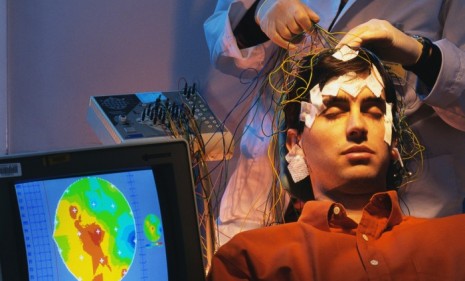Can mind-reading prevent terrorist attacks?
A new brain-wave monitoring technique could help U.S. authorities unlock the secret plans of suspected terrorists

A free daily email with the biggest news stories of the day – and the best features from TheWeek.com
You are now subscribed
Your newsletter sign-up was successful
Mind-reading may soon become a useful anti-terrorism tool. A team of researchers at Northwestern University have accurately predicted the plots of "mock terrorist plans" by reading the brain waves of volunteer would-be terrorist "suspects." Theoretically, the technique could help authorities uncover terrorist attacks before they take innocent lives, but just how viable is this Minority Report-like approach? (Watch a scene from Minority Report.) Here, a guide:
How was the study conducted?
Scientists gave 29 students 30 minutes to plan a mock attack on a target U.S. city; subjects were asked to write a letter about the plan to deeply ingrain details such as location, method, and timing in their memories. Electrodes were then attached to these faux-terrorists' scalps to monitor their "P300" brain waves, which spike when a guilty person is presented with damning information. As the names of various U.S. cities were flashed on a computer screen, the participants' P300 activity tended to increase sharply when their chosen "target city" appeared.
The Week
Escape your echo chamber. Get the facts behind the news, plus analysis from multiple perspectives.

Sign up for The Week's Free Newsletters
From our morning news briefing to a weekly Good News Newsletter, get the best of The Week delivered directly to your inbox.
From our morning news briefing to a weekly Good News Newsletter, get the best of The Week delivered directly to your inbox.
How accurate were their results?
Very. Even "without any prior knowledge of the planned crime in our mock terrorism scenarios, we were able to identify 10 out of 12 terrorists and...20 out of 30 crime-related details," says J. Peter Rosenfeld, the study's lead researcher. "The test was 83 percent accurate in predicting concealed knowledge, suggesting that our complex protocol could identify future terrorist activity."
How will the technology be used in real scenarios?
Authorities often monitor "chatter" — communications to and from terrorist suspects — in an attempt to gather details about possible attacks. Researchers hope that authorities could use the P300 technology to grill suspects they've arrested and confirm details that came up in the chatter.
A free daily email with the biggest news stories of the day – and the best features from TheWeek.com
Sources: Psychophysiology, R&D Mag, Science Blog, Popular Science, Smithsonian Magazine
-
 Is Andrew’s arrest the end for the monarchy?
Is Andrew’s arrest the end for the monarchy?Today's Big Question The King has distanced the Royal Family from his disgraced brother but a ‘fit of revolutionary disgust’ could still wipe them out
-
 Quiz of The Week: 14 – 20 February
Quiz of The Week: 14 – 20 FebruaryQuiz Have you been paying attention to The Week’s news?
-
 The Week Unwrapped: Do the Freemasons have too much sway in the police force?
The Week Unwrapped: Do the Freemasons have too much sway in the police force?Podcast Plus, what does the growing popularity of prediction markets mean for the future? And why are UK film and TV workers struggling?